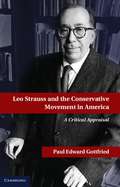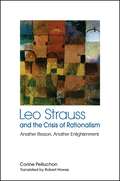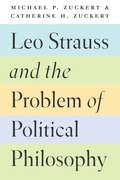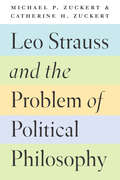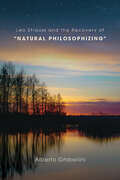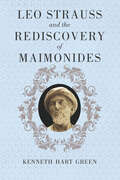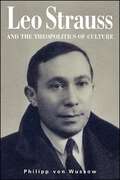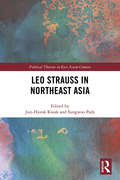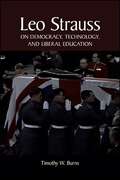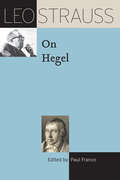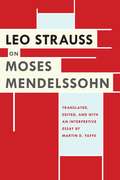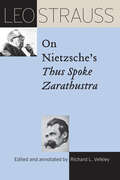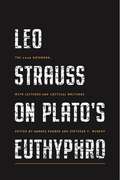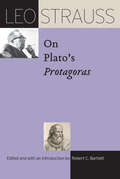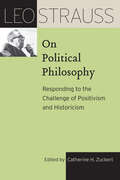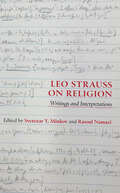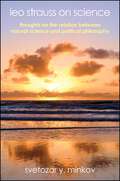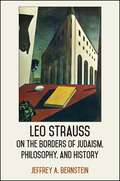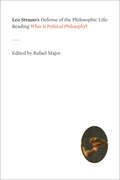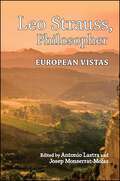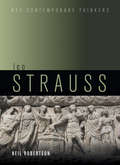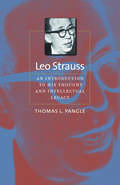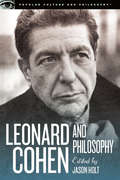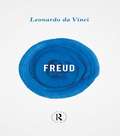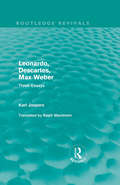- Table View
- List View
Leo Strauss and the Conservative Movement in America
by Paul E. GottfriedThis book offers an original interpretation of the achievement of Leo Strauss, stressing how his ideas and followers reshaped the American conservative movement. The conservative movement that reached out to Strauss and his legacy was extremely fluid and lacked a self-confident leadership. Conservative activists and journalists felt a desperate need for academic acceptability, which they thought Strauss and his disciples would furnish. They also became deeply concerned with the problem of 'value relativism', which self-described conservatives thought Strauss had effectively addressed. But until recently, neither Strauss nor his disciples have considered themselves to be 'conservatives'. Contrary to another misconception, Straussians have never wished to convert Americans to ancient political ideals and practices, except in a very selective rhetorical fashion. Strauss and his disciples have been avid champions of American modernity, and 'timeless' values as interpreted by Strauss and his followers often look starkly contemporary.
Leo Strauss and the Crisis of Rationalism: Another Reason, Another Enlightenment (SUNY series in the Thought and Legacy of Leo Strauss)
by Corine PelluchonHow can Leo Strauss's critique of modernity and his return to tradition, especially Maimonides, help us to save democracy from its inner dangers? In this book, Corine Pelluchon examines Strauss's provocative claim that the conception of man and reason in the thought of the Enlightenment is self-destructive and leads to a new tyranny. Writing in a direct and lucid style, Pelluchon avoids the polemics that have characterized recent debates concerning the links between Strauss and neoconservatives, particularly concerns over Strauss's relation to the extreme right in Germany. Instead she aims to demystify the origins of Strauss's thought and present his relationship to German and Jewish thought in the early twentieth century in a manner accessible not just to the small circles devoted to the study of Strauss, but to a larger public. Strauss's critique of modernity is, she argues, constructive; he neither condemns modernity as a whole nor does he desire a retreat back to the Ancients, where slaves existed and women were not considered citizens. The question is to know whether we can learn something from the Ancients and from Maimonides—and not merely about them.
Leo Strauss and the Problem of Political Philosophy
by Catherine H. Zuckert Michael P. ZuckertLeo Strauss and his alleged political influence regarding the Iraq War have in recent years been the subject of significant media attention, including stories in the Wall Street Journal and New York Times. Time magazine even called him "one of the most influential men in American politics. ” With The Truth about Leo Strauss, Michael and Catherine Zuckert challenged the many claims and speculations about this notoriously complex thinker. Now, with Leo Strauss and the Problem of Political Philosophy, they turn their attention to a searching and more comprehensive interpretation of Strauss’s thought as a whole, using the many manifestations of the "problem of political philosophy” as their touchstone. For Strauss, political philosophy presented a "problem” to which there have been a variety of solutions proposed over the course of Western history. Strauss’s work, they show, revolved around recovering--and restoring--political philosophy to its original Socratic form. Since positivism and historicism represented two intellectual currents that undermined the possibility of a Socratic political philosophy, the first part of the book is devoted to Strauss’s critique of these two positions. Then, the authors explore Strauss’s interpretation of the history of philosophy and both ancient and modern canonical political philosophers, including Plato, Aristotle, Machiavelli, and Locke. Strauss’s often-unconventional readings of these philosophers, they argue, pointed to solutions to the problem of political philosophy. Finally, the authors examine Strauss’s thought in the context of the twentieth century, when his chief interlocutors were Schmitt, Husserl, Heidegger, and Nietzsche. The most penetrating and capacious treatment of the political philosophy of this complex and often misunderstood thinker, from his early years to his last works, Leo Strauss and the Problem of Political Philosophy reveals Strauss’s writings as an attempt to show that the distinctive characteristics of ancient and modern thought derive from different modes of solving the problem of political philosophy and reveal why he considered the ancient solution both philosophically and politically superior.
Leo Strauss and the Problem of Political Philosophy
by Catherine H. Zuckert Michael P. ZuckertLeo Strauss and his alleged political influence regarding the Iraq War have in recent years been the subject of significant media attention, including stories in the Wall Street Journal and New York Times.Time magazine even called him “one of the most influential men in American politics.” With The Truth about Leo Strauss, Michael and Catherine Zuckert challenged the many claims and speculations about this notoriously complex thinker. Now, with Leo Strauss and the Problem of Political Philosophy, they turn their attention to a searching and more comprehensive interpretation of Strauss’s thought as a whole, using the many manifestations of the “problem of political philosophy” as their touchstone. For Strauss, political philosophy presented a “problem” to which there have been a variety of solutions proposed over the course of Western history. Strauss’s work, they show, revolved around recovering—and restoring—political philosophy to its original Socratic form. Since positivism and historicism represented two intellectual currents that undermined the possibility of a Socratic political philosophy, the first part of the book is devoted to Strauss’s critique of these two positions. Then, the authors explore Strauss’s interpretation of the history of philosophy and both ancient and modern canonical political philosophers, including Plato, Aristotle, Machiavelli, and Locke. Strauss’s often-unconventional readings of these philosophers, they argue, pointed to solutions to the problem of political philosophy. Finally, the authors examine Strauss’s thought in the context of the twentieth century, when his chief interlocutors were Schmitt, Husserl, Heidegger, and Nietzsche. The most penetrating and capacious treatment of the political philosophy of this complex and often misunderstood thinker, from his early years to his last works, Leo Strauss and the Problem of Political Philosophy reveals Strauss’s writings as an attempt to show that the distinctive characteristics of ancient and modern thought derive from different modes of solving the problem of political philosophy and reveal why he considered the ancient solution both philosophically and politically superior.
Leo Strauss and the Recovery of "Natural Philosophizing" (SUNY series in the Thought and Legacy of Leo Strauss)
by Alberto Marco GhibelliniAmong the political philosophers of the twentieth century, Leo Strauss is usually singled out for his attempt to revitalize the ancient approach to counter the relativism of both historicism and positivism. It is less commonly underscored, however, that the cornerstone of this attempt is the recovery of the question of "nature," which he regarded as inseparable from genuine philosophy since its inception in ancient Greece. Leo Strauss and the Recovery of "Natural Philosophizing" addresses such a theme, focusing on the theoretical presuppositions that Strauss found at the basis of the acquired inability to raise the question of nature. Prominent among these is the encounter between philosophy and revelation, which, due to their conceptual incompatibility, leads to a condition Strauss metaphorically described as a "second, 'unnatural' cave" characterized by insurmountable "prejudices" rather than "appearance and opinion." These, however, are the starting point of genuine philosophy in the Platonic "first, 'natural' cave," which has to be regained, by way of historical deconstruction of the presuppositions of the second cave, if the "natural philosophizing" embodied by Socratic dialectics is to be reactivated.
Leo Strauss and the Rediscovery of Maimonides
by Kenneth Hart GreenIn Leo Strauss and the Rediscovery of Maimonides, Kenneth Hart Green explores the critical role played by Maimonides in shaping Leo Strauss’s thought. In uncovering the esoteric tradition employed in Maimonides’s Guide of the Perplexed, Strauss made the radical realization that other ancient and medieval philosophers might be concealing their true thoughts through literary artifice. Maimonides and al-Farabi, he saw, allowed their message to be altered by dogmatic considerations only to the extent required by moral and political imperatives and were in fact avid advocates for enlightenment. Strauss also revealed Maimonides’s potential relevance to contemporary concerns, especially his paradoxical conviction that one must confront the conflict between reason and revelation rather than resolve it. An invaluable companion to Green’s comprehensive collection of Strauss’s writings on Maimonides, this volume shows how Strauss confronted the commonly accepted approaches to the medieval philosopher, resulting in both a new understanding of Maimonides and a new depth and direction for his own thought. It will be welcomed by anyone engaged with the work of either philosopher.
Leo Strauss and the Theopolitics of Culture (SUNY series in the Thought and Legacy of Leo Strauss)
by Philipp von Wussow2020 CHOICE Outstanding Academic TitleIn this book, Philipp von Wussow argues that the philosophical project of Leo Strauss must be located in the intersection of culture, religion, and the political. Based on archival research on the philosophy of Strauss, von Wussow provides in-depth interpretations of key texts and their larger theoretical contexts. Presenting the necessary background in German-Jewish philosophy of the interwar period, von Wussow then offers detailed accounts and comprehensive interpretations of Strauss's early masterwork, Philosophy and Law, his wartime lecture "German Nihilism," the sources and the scope of Strauss's critique of modern "relativism," and a close commentary on the late text "Jerusalem and Athens." With its rare blend of close reading and larger perspectives, this book is valuable for students of political philosophy, continental thought, and twentieth-century Jewish philosophy alike. It is indispensable as a guide to Strauss's philosophical project, as well as to some of the most intricate details of his writings.
Leo Strauss in Northeast Asia (Political Theories in East Asian Context)
by Sungwoo Park Jun-Hyeok KwakThis book analyzes the reception of Leo Strauss and his political philosophy in Northeast Asia. By juxtaposing the central idea of Strauss’s political philosophy with the question of modernity, the contributors explore the eclectic adaptations of Strauss in Northeast Asian countries as a philosophical appropriation across cultures. Examining how Strauss’s philosophy was first introduced in Northeast Asia, the book sheds light on the similarities and differences in experiences, challenging the dominant approach which attributes various receptions of Strauss in Northeast Asia solely to sociopolitical circumstances. This book also seeks to move beyond a China-centric approach to investigate the possible transcultural appeals of Strauss’s political philosophy by exploring the cases of Japan and South Korea. Appealing to a wide network of scholars and practitioners in East Asia engaged in rethinking cultural particularities, this volume will be attractive to upper-level undergraduate students, graduate students, and advanced researchers in political philosophy, political theory, and Asian politics.
Leo Strauss on Democracy, Technology, and Liberal Education: On Democracy, Technology, And Liberal Education (SUNY series in the Thought and Legacy of Leo Strauss)
by Timothy W. BurnsLiberal democracy is today under unprecedented attack from both the left and the right. Offering a fresh and penetrating examination of how Leo Strauss understood the emergence of liberal democracy and what is necessary to sustain and elevate it, Leo Strauss on Democracy, Technology, and Liberal Education explores Strauss' view of the intimate (and troubling) relation between the philosophic promotion of liberal democracy and the turn to the modern scientific-technological project of the "conquest of nature." Timothy W. Burns explicates the political reasoning behind Strauss' recommendation of reminders of genuine political greatness within democracy over and against the failure of nihilistic youth to recognize it. Elucidating what Strauss envisaged by a liberally-educated sub-political or cultural-level aristocracy—one that could elevate and sustain liberal democracy—and the roles that both philosophy and divine-law traditions should have in that education, Burns also lays out Strauss' frequent (though often tacit) engagement with the thought of Heidegger on these issues.
Leo Strauss on Hegel (The Leo Strauss Transcript Series)
by Leo StraussIn the winter of 1965, Leo Strauss taught a seminar on Hegel at the University of Chicago. While Strauss neither considered himself a Hegelian nor wrote about Hegel at any length, his writings contain intriguing references to the philosopher, particularly in connection with his studies of Hobbes, in his debate in On Tyranny with Alexandre Koje`ve; and in his account of the “three waves” of modern political philosophy. Leo Strauss on Hegel reconstructs Strauss’s seminar on Hegel, supplemented by passages from an earlier version of the seminar from which only fragments of a transcript remain. Strauss focused his seminar on the lectures collected in The Philosophy of History, which he considered more accessible than Hegel’s written works. In his own lectures on Hegel, Strauss continues his project of demonstrating how modern philosophers related to ancient thought and explores the development and weaknesses of modern political theory. Strauss is especially concerned with the relationship in Hegel between empirical history and his philosophy of history, and he argues for the primacy of religion in Hegel’s understanding of history and society. In addition to a relatively complete transcript, Leo Strauss on Hegel also includes annotations, which bring context and clarity to the text.
Leo Strauss on Moses Mendelssohn
by Leo StraussMoses Mendelssohn (1729–86) was the leading Jewish thinker of the German Enlightenment and the founder of modern Jewish philosophy. His writings, especially his attempt during the Pantheism Controversy to defend the philosophical legacies of Spinoza and Leibniz against F. H. Jacobi’s philosophy of faith, captured the attention of a young Leo Strauss and played a critical role in the development of his thought on one of the fundamental themes of his life’s work: the conflicting demands of reason and revelation. Leo Strauss on Moses Mendelssohn is a superbly annotated translation of ten introductions written by Strauss to a multi-volume critical edition of Mendelssohn’s work. Commissioned in Weimar Germany in the 1920s, the project was suppressed and nearly destroyed during Nazi rule and was not revived until the 1960s. In addition to Strauss’s introductions, Martin D. Yaffe has translated Strauss’s editorial remarks on each of the passages he annotates in Mendelssohn’s texts and brings those together with the introductions themselves. Yaffe has also contributed an extensive interpretive essay that both analyzes the introductions on their own terms and discusses what Strauss writes elsewhere about the broader themes broached in his Mendelssohn studies. Strauss’s critique of Mendelssohn represents one of the largest bodies of work by the young Strauss on a single thinker to be made available in English. It illuminates not only a formerly obscure phase in the emergence of his thought but also a critical moment in the history of the German Enlightenment.
Leo Strauss on Nietzsche's Thus Spoke Zarathustra (The Leo Strauss Transcript Series)
by Leo Strauss Richard L. VelkleyAlthough Leo Strauss published little on Nietzsche, his lectures and correspondence demonstrate a deep critical engagement with Nietzsche’s thought. One of the richest contributions is a seminar on Nietzsche’s Thus Spoke Zarathustra, taught in 1959 during Strauss’s tenure at the University of Chicago. In the lectures, Strauss draws important parallels between Nietzsche’s most important project and his own ongoing efforts to restore classical political philosophy. With Leo Strauss on Nietzsche’s “Thus Spoke Zarathustra,” eminent Strauss scholar Richard L. Velkley presents Strauss’s lectures on Zarathustra with superb annotations that bring context and clarity to the critical role played by Nietzsche in shaping Strauss’s thought. In addition to the broad relationship between Nietzsche and political philosophy, Strauss adeptly guides readers through Heidegger’s confrontations with Nietzsche, laying out Heidegger’s critique of Nietzsche’s “will to power” while also showing how Heidegger can be read as a foil for his own reading of Nietzsche. The lectures also shed light on the relationship between Heidegger and Strauss, as both philosophers saw Nietzsche as a central figure for understanding the crisis of philosophy and Western civilization. Strauss’s reading of Nietzsche is one of the important—yet little appreciated—philosophical inquiries of the past century, both an original interpretation of Nietzsche’s thought and a deep engagement with the core problems that modernity posed for political philosophy. It will be welcomed by anyone interested in the work of either philosopher.
Leo Strauss on Plato’s Euthyphro: The 1948 Notebook, with Lectures and Critical Writings
by Hannes Kerber and Svetozar Y. MinkovLeo Strauss famously asserted that the fundamental, defining debate within Western civilization is that between Jerusalem and Athens, piety and philosophy, the Bible and Plato. And yet, surprisingly, Strauss never published any of his thoughts on Plato’s dialogue on piety, the Euthyphro.This volume presents, for the first time, Strauss’s 1948 notebook on the dialogue, written in preparation for a class at the New School for Social Research. Featuring close analysis and line-by-line commentary, the notebook opens a window onto a philosophic mind in action, as Strauss asks questions of the classic text, jots down observations and formulations, and analyzes very specific terms and arguments but also steps back, reviews the overall movement of the dialogue, and reconsiders previous conclusions. Beyond the notebook, the volume also brings together all the known materials that lay out Strauss’s thoughts on the Euthyphro. This includes newly transcribed and edited public lectures, illuminating appendixes, critical essays by volume editors Hannes Kerber and Svetozar Y. Minkov and scholar Wayne Ambler, an account of Strauss’s public lecture, and a new English translation of Plato’s Euthyphro by Seth Benardete, a classicist and one of Strauss’s students.Engaging and inspiring, Leo Strauss on Plato’s “Euthyphro” is a vital resource for scholars and students of political theory, readers interested in the intersection of philosophy and religion, and a must-have for anyone who studies Strauss.
Leo Strauss on Plato’s Protagoras (The Leo Strauss Transcript Series)
by Leo StraussA transcript of Leo Strauss’s key seminars on Plato’s Protagoras. This book offers a transcript of Strauss’s seminar on Plato’s Protagoras taught at the University of Chicago in the spring quarter of 1965, edited and introduced by renowned scholar Robert C. Bartlett. These lectures have several important features. Unlike his published writings, they are less dense and more conversational. Additionally, while Strauss regarded himself as a Platonist and published some work on Plato, he published little on individual dialogues. In these lectures Strauss treats many of the great Platonic and Straussian themes: the difference between the Socratic political science or art and the Sophistic political science or art of Protagoras; the character and teachability of virtue, its relation to knowledge, and the relations among the virtues, courage, justice, moderation, and wisdom; the good and the pleasant; frankness and concealment; the role of myth; and the relation between freedom of thought and freedom of speech. In these lectures, Strauss examines Protagoras and the sophists, providing a detailed discussion of Protagoras as it relates to Plato’s other dialogues and the work of modern thinkers. This book should be of special interest to students both of Plato and of Strauss.
Leo Strauss on Political Philosophy: Responding to the Challenge of Positivism and Historicism (The Leo Strauss Transcript Series)
by Catherine H. Zuckert Leo StraussLeo Strauss is known primarily for reviving classical political philosophy through careful analyses of works by ancient thinkers. As with his published writings, Strauss’s seminars devoted to specific philosophers were notoriously dense, accessible only to graduate students and scholars with a good command of the subject. In 1965, however, Strauss offered an introductory course on political philosophy at the University of Chicago. Using a conversational style, he sought to make political philosophy, as well as his own ideas and methods, understandable to those with little background on the subject. Leo Strauss on Political Philosophy brings together the lectures that comprise Strauss’s “Introduction to Political Philosophy.” Strauss begins by emphasizing the importance of political philosophy in determining the common good of society and critically examining the two most powerful contemporary challenges to the possibility of using political theory to learn about and develop the best political order: positivism and historicism. In seeking the common good, classical political philosophers like Plato and Aristotle did not distinguish between political philosophy and political science. Today, however, political philosophy must contend with the contemporary belief that it is impossible to know what the good society really is. Strauss emphasizes the need to study the history of political philosophy to see whether the changes in the understanding of nature and conceptions of justice that gradually led people to believe that it is not possible to determine what the best political society is are either necessary or valid. In doing so, he ranges across the entire history of political philosophy, providing a valuable, thematically coherent foundation, including explications of many canonical thinkers, such as Auguste Comte and Immanuel Kant, about whom Strauss did not write extensively in his published writings.
Leo Strauss on Religion: Writings and Interpretations (SUNY series in the Thought and Legacy of Leo Strauss)
by Svetozar Y. Minkov Rasoul NamaziIntriguing unpublished manuscripts by Leo Strauss, which explore the intricate relationship between religion, philosophy, and politics, accompanied by fourteen interpretative essays.Addressing the central theme of his work-the complex relationship between religion, philosophy, and politics-the twelve newly available transcripts included in Leo Strauss on Religion offer unprecedented insights into Leo Strauss's thoughts on previously unexplored subjects. Essential for both avid readers and newcomers, this collection unveils sharper formulations and frank discussions, providing a rare peek into the ambiguous aspects of Strauss's renowned reticence in formulating his ultimate thoughts. Accompanied by fourteen interpretative essays from distinguished scholars, this volume serves as a comprehensive guide to Strauss's intellectual odyssey. Offering fresh perspectives, these essays navigate the understudied aspects of Strauss's reflections on religion, putting his thought in a new perspective thereby enriching the scholarly debate around the controversial yet influential legacy of Leo Strauss.
Leo Strauss on Science: Thoughts on the Relation between Natural Science and Political Philosophy (SUNY series in the Thought and Legacy of Leo Strauss)
by Svetozar Y. MinkovDrawing upon a wealth of previously unpublished archival material, Leo Strauss on Science brings to light the thoughts of Leo Strauss on the problem of science. Introducing us to Strauss's reflections on the meaning and perplexities of the scientific adventure, Svetozar Y. Minkov explores questions such as: Is there a human wisdom independent of science? What is the relation between poetry and mathematics, or between self-knowledge and theoretical physics? And how necessary is it for the human species to exist immutably in order for the classical analysis of human life to be correct? In pursuing these questions, Minkov aims to change the conversation about Strauss, one of the great thinkers of the past century.
Leo Strauss on the Borders of Judaism, Philosophy, and History (SUNY series in the Thought and Legacy of Leo Strauss)
by Jeffrey A. BernsteinIn Leo Strauss on the Borders of Judaism, Philosophy, and History, Jeffrey A. Bernstein explores how the thought of Leo Strauss amounts to a model for thinking about the connection between philosophy, Jewish thought, and history. For Bernstein, Strauss shows that a close study of the history of philosophy—from the "ancients" to "medievals" to "moderns"—is necessary for one to appreciate the fundamental distinction between the forms of life Strauss terms "Jerusalem" and "Athens," that is, order through revealed Law and free philosophical thought, respectively. Through an investigation of Strauss's published texts; examination of his intellectual biography and history; and making use of correspondence, archival materials, and seminar transcripts, Bernstein shows how Strauss's concern with the relation between Judaism and philosophy spanned his entire career. His findings will be of use to those interested in the thought of Strauss, the history of Jewish thought, and the relation between religion, philosophy, and politics.
Leo Strauss's Defense of the Philosophic Life: Reading "What Is Political Philosophy?"
by Rafael MajorLeo Strauss's What Is Political Philosophy? addresses almost every major theme in his life's work and is often viewed as a defense of his overall philosophic approach. Yet precisely because the book is so foundational, if we want to understand Strauss's notoriously careful and complex thinking in these essays, we must also consider them just as Strauss treated philosophers of the past: on their own terms. Each of the contributors in this collection focuses on a single chapter from What Is Political Philosophy? in an effort to shed light on both Strauss's thoughts about the history of philosophy and the major issues about which he wrote. Included are treatments of Strauss's esoteric method of reading, his critique of behavioral political science, and his views on classical political philosophy. Key thinkers whose work Strauss responded to are also analyzed in depth: Plato, Al Farabi, Maimonides, Hobbes, and Locke, as well as twentieth century figures such as Eric Voegelin, Alexandre Kojève, and Kurt Riezler. Written by scholars well known for their insight and expertise on Strauss's thought, the essays in this volume apply to Strauss the same meticulous approach he developed in reading others. The first book length treatment on a single book by Strauss, Leo Strauss's Defense of the Philosophic Life will serve as an invaluable companion to those seeking a helpful introduction or delving deeper into the major themes and ideas of this controversial thinker.
Leo Strauss, Philosopher: European Vistas (SUNY series in the Thought and Legacy of Leo Strauss)
by Antonio Lastra; Josep Monserrat-MolasThis volume presents, for the first time in English, the approaches to Leo Strauss being pursued by European scholars in Spain, Italy, and Germany. Whereas the traditions of Strauss interpretation have, until recently, focused on issues of interest to political science and, to a lesser extent, religious studies, this collection makes a powerful contribution to the recent philosophical consideration of Strauss. Each essay treats a unique thread emerging from the tapestry of Straussian thought, illustrating Strauss's thinking on the reading of ancient texts and on the relationship between philosophy and politics. In doing so, Strauss is placed squarely and uncompromisingly within the history of philosophy, in conversation with a large range of philosophical figures.
Leo Strauss: An Introduction (Key Contemporary Thinkers)
by Neil G. RobertsonLeo Strauss’s lifelong intellectual mission was to recover ‘classical rationalism’, a pursuit that has made him a controversial figure to this day. While his critics see him as responsible for a troubling anti-democratic strain in modern politics, others argue that his thought is in fact the best defence of responsible democracy. Neil Robertson’s new introduction to Strauss aims to transcend these divides and present a non-partisan account of his thought. He shows how Strauss’ intellectual formation in Weimar Germany and flight from Nazism led him to develop a critique of modernity that tended to support a conservative politics, while embracing a radical sense of what philosophy is and can be. He examines the way in which Strauss built upon the thought of Nietzsche and Heidegger in order to show how their 'nihilism' led not to a standpoint beyond western rationality, but to a recovery of its roots. This skillful reconstruction of the coherence and unity of Strauss’ thought is the essential guide for anyone wishing to fully grasp the contribution of one of the most contentious and intriguing figures in 20th century intellectual history.
Leo Strauss: An Introduction to His Thought and Intellectual Legacy (The Johns Hopkins Series in Constitutional Thought)
by Thomas L. PangleLeo Strauss's controversial writings have long exercised a profound subterranean cultural influence. Now their impact is emerging into broad daylight, where they have been met with a flurry of poorly informed, often wildly speculative, and sometimes rather paranoid pronouncements.This book, written as a corrective, is the first accurate, non-polemical, comprehensive guide to Strauss's mature political philosophy and its intellectual influence. Thomas L. Pangle opens a pathway into Strauss's major works with one question: How does Strauss's philosophic thinking contribute to our democracy's civic renewal and to our culture's deepening, critical self-understanding?This book includes a synoptic critical survey of writings from scholars who have extended Strauss's influence into the more practical, sub-philosophic fields of social and political science and commentary. Pangle shows how these analysts have in effect imported Straussian impulses into a "new" kind of political and social science.
Leonard Cohen and Philosophy: Various Positions
by Jason HoltFrom the early years, when he morphed from celebrated poet to provocative singer-songwriter, to his induction into the Rock and Roll Hall of Fame, Leonard Cohen has endured as one of the most enigmatic and profound figures-with a uniquely compelling voice and unparalleled depth of artistic vision-in all of popular music.<P><P> The aesthetic quality and intellectual merit of Cohen's work are above dispute; here, for the first time, a team of philosophers takes an in-depth look at its real significance.Want to know what Cohen and Kierkegaard have in common? Or whether Cohen rivals the great philosophical pessimist Schopenhauer? Then this book is for you. It provides the first thorough analysis of Cohen from various (philosophical) positions. It is intended not only for Cohen fans but also undergraduates in philosophy and other areas. It explores important neglected aspects of Cohen's work without attempting to reduce them to academic tropes, yet nonetheless will also be useful to academics-or anyone-beguiled by the enigma that is Leonard Cohen.
Leonardo da Vinci: A Memory Of His Childhood (Routledge Great Minds)
by Sigmund FreudSigmund Freud was already internationally acclaimed as the principal founder of psychoanalysis when he turned his attention to the life of Leonardo da Vinci. It remained Freud’s favourite composition. Compressing many of his insights into a few pages, the result is a fascinating picture of some of Freud’s fundamental ideas, including human sexuality, dreams, and repression. It is an equally compelling – and controversial – portrait of Leonardo and the creative forces that according to Freud lie behind some of his great works, including the Mona Lisa. With a new foreword by Maria Walsh.
Leonardo, Descartes, Max Weber: Three Essays (Routledge Revivals)
by Karl JaspersFirst published in 1965, this collection of three essays by influential German philosopher Karl Jaspers deals with the response of the philosophical mind to the world of reality, with the search for truth. In Leonardo, this search is shown in the thinking and the works of a supreme artist whose means of apperception are the senses. The essay on Max Weber commemorates a man Jaspers knew personally and ardently admired. The main essay in the collection is an exhaustive, three part study of Descartes: analysing Descartes’ new philosophical operation, Descartes’ Method, and the position of his philosophy within the wider historical context of philosophical thought.
